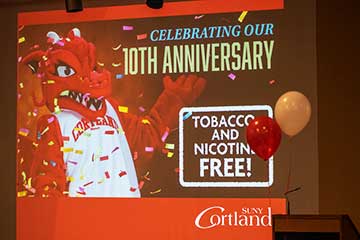
01/31/2023
As one of the nation’s healthiest campuses, SUNY Cortland was an early pioneer in tobacco health initiatives. Now, the university is proud to celebrate a landmark decade as a tobacco- and nicotine-free campus.
The event, Celebrating 10 Years of Tobacco and Nicotine Free, took place Wednesday, Feb. 1, at the Corey Union Exhibition Lounge. It was sponsored by The President’s Office and the Tobacco and Nicotine Advisory Committee.
“I’m very proud of SUNY Cortland that we were one of the first to implement this policy SUNY-wide and that we have expanded to include nicotine free as well,” said Health Educator Lauren Scagnelli '12 M '14, CHES. “The university as a whole values wellness and this is one accomplishment to showcase that.”
College President Erik J. Bitterbaum and Cathy Smith, the emeritus health educator who helped lead the original initiative, made opening remarks. Other highlights included a new tobacco- and nicotine-free graphic mark developed for use on campus, a display of photos and information documenting the history of the initiative, and a takeaway list of cessation resources.
SUNY Cortland first restricted smoking to certain designated areas on campus more than 30 years ago in 1989. The proposal for a tobacco-free campus was first approved on July 25, 2011, and Cortland officially became tobacco free on Jan. 1, 2013. The university was the second SUNY institution to take this now common step to ensure the health of its students, faculty and staff.
In 2018, all forms of nicotine were added to the ban as growing evidence of significant health risks was linked to electronic cigarette devices.
Coinciding with Cortland’s tobacco-free anniversary year, the university will feature Dr. Brian King as the speaker for its 2023 Poskanzer Lecture on April 4. King is the director of the Food and Drug Administration's Center for Tobacco Products.
“There are many health and financial benefits of either quitting or not using tobacco or nicotine,” Scagnelli said. “First, our lungs are for breathing air and not chemicals. Tobacco and nicotine harm the developing adolescent brain and increases the risk of lung injury and addiction among other health hazards.”
Cortland continues to provide support for anyone trying to quit or looking to contribute to a healthier campus. Students can also speak with either the health educator, prevention educator or Student Health Services about specific needs. Employees can contact Human Resources or the Employee Assistance Program.
More information on all the additional work done by the university to ensure the health of its community can be found at Counseling and Wellness Services.